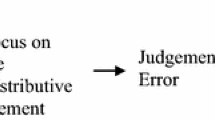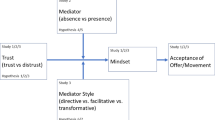Abstract
The thesis of the paper is that measuring negotiator performance correctly is difficult because the values that those of us who measure negotiator performance think negotiators are maximizing may differ from the values negotiators are actually maximizing. When such discrepant values exist, using performance measures that do not account for them can lead easily to incorrect conclusions about negotiator performance. Indeed, good performance may be judged poor, and vice-versa. This paper explores several related literatures, including the experimental-bargaining, behavioral-decision-making, and procedural-justice literatures, to demonstrate that discrepant values exist. It then demonstrates that whenever performance measures are used as dependent variables in negotiation experiments, the existence of discrepant values can lead to both Type I and Type II construct-validity errors.
Similar content being viewed by others
References
Allred, K., J. Matsui, and C. Raia. (1997). “The Influence of Anger and Compassion on Negotiation Performance,” Organizational Behavior and Human Decision Processes 70, 175–187.
Axelrod, R. (1984). The Evolution of Cooperation. New York: Basic.
Bazerman, M.H., G.F. Loewenstein, and S.B. White. (1992). “Reversals of Preference in Allocation Decisions: Judging an Alternative Versus Choosing Among Alternatives.” Administrative Science Quarterly 37, 220–240.
Bazerman, M.H., T. Magliozzi, and M.A. Neale. (1985). “Integrative Bargaining in a Competitive Market.” Organizational Behavior and Human Decision Processes 35, 294–313.
Bell, D.E. (1982). “Regret in Decision Making Under Uncertainty.” Operations Research 30, 961–981.
Campbell, D.T. (1957). “Factors Relevant to the Validity of Experiments in Social Settings.” Psychological Bulletin 54, 297–312.
Campbell, D.T., and J.C. Stanley. (1963). “Experimental and Quasi-experimental Designs for Research on Teaching.” In N.L. Gage (ed.). Handbook of Research on Teaching (pp. 171–246). Chicago: Rand McNally.
Chernaik, J. (1988). “Blessing 'A Walk in the Woods.' ” The Times Literary Supplement N4468: 1281.
Christensen, L. (1977). “The Negative Subject: Myth, Reality, or a Prior Experience Effect.” Journal of Personality and Social Psychology 35, 392–400.
Clyman, D.R. (1996). “Measuring Cooperation in Negotiations: The Impossible Dream.” In R.J. Zeckhauser, R.L. Keeney and J.K. Sebenius (eds.). Wise Choices: Decisions, Games, and Negotiations. Boston, MA: Harvard Business School Press.
Clyman, D.R. (1995). “Measures of Joint Performance in Dyadic Mixed-motive Negotiations.” Organizational Behavior and Human Decision Processes 64, 38–48.
Clyman, D.R. (1996). Irrational Values, Confounded Measures, Unobservable Outcomes, and Unanswerable Questions. Darden School Working Paper #96–01.
Cook, T.D., and D.T. Campbell. (1979). Quasi-experimentation: Design and Analysis Issues for Field Settings. Boston, MA: Houghton-Mifflin.
Eliashberg, J., S.A. LaTour, A. Rangaswamy, and L.W. Stern. (1986). “Assessing the Predictive Accuracy of Two Utility-based Theories in a Marketing Channel Negotiation Context.” Journal of Marketing Research 23, 101–110.
Fillenbaum, S. (1966). “Prior Deception and Subsequent Experimental Performance: The 'Faithful' Subject.” Journal of Personality and Social Psychology 4, 532–537.
Gordon, M.E., N. Schmitt, and W.G. Schneider. (1984). “Laboratory Research on Bargaining and Negotiations: An Evaluation.” Industrial Relations 23, 218–233.
Gordon, M.E., L.A. Slade, and N. Schmitt. (1986). “The 'Science of the Sophmore' Revisited: From Conjecture to Empiricism.” Academy of Management Journal 11, 191–207.
Gordon, M.E., L.A. Slade, and N. Schmitt. (1987). “Student Guinea Pigs: Porcing Predictors and Particularistic Phenomena.” Academy of Management Journal 12, 160–163.
Greenberg, J. (1987). “The College Sophmore as Guinea Pig: Setting the Record Straight.” Academy of Management Journal 12, 157–159.
Greenberg, J., and R. Folger. (1988). Controversial Issues in Social Research Methods (pp. 95–120). New York: Springer-Verlag.
Guth, W., R. Schmittberger, and B. Schwarze. (1982). “An Experimental Analysis of Ultimatum Bargaining.” Journal of Economic Behavior and Organization 3, 367–388.
Kahn, R.L., and R.M. Kramer. (1990). “Untying the Knot: De-escalatory Processes in International Conflict.” In R.L. Kahn and M.N. Zald (eds.). Organizations and Nation-States: New Perspectives on Conflict and Cooperation (pp. 139–180). San Francisco: Jossey-Bass.
Kahneman, D., and A. Tversky. (1979). “Prospect Theory: An Analysis of Decision Under Risk.” Econometrica 47, 263–291.
Kelly, H.H. (1996). “A Classroom Study of The Dilemmas in Interpersonal Negotiation.” In K. Archibald (ed.). Strategic Interaction and Conflict. Berkeley, CA: University of California Press.
Kelley, H.H., and J. Thibaut. (1978). Interpersonal Relations: A Theory of Interdependence. New York: John Wiley & Sons.
Kruglanski, A.W. (1975). “The Human Subject in the Psychology Experiment: Fact and Artifact.” In L. Berkowitz (ed.). Advances in Experimental Psychology (Vol. 8). New York: Academic Press.
Lax, D.A., and J.K. Sebenius. (1987). Measuring the Degree of Joint Gains Achieved by Negotiators. Unpublished manuscript. Cambridge, MA: Harvard University.
Leventhal, G.S. (1980). “What Should be Done with Equity Theory? New Approaches to the Study of Fairness in Social Relationships.” In K. Gergen, M. Greenberg, and R. Willis (eds.). Social Exchange: Advances in Theory and Research (pp. 27–55).
Loewenstein, G., L. Thompson, and M.H. Bazerman. (1989). “Social Utility and Decision Making in Interpersonal Contexts.” Journal of Personality and Social Psychology 57, 426–441.
Masling, J. (1966). “Role-related Behavior of the Subject and Psychologist and its Effects upon Psychological Data.” In D. Levine (ed.). Nebraska Symposium on Motivation (pp. 67–103). Lincoln, NE: University of Nebraska Press.
Meyer, H.D., and L.K. Williams. (1993). “Norms and Emotions in Bargaining. Exploring the Socio-economics of Conflict.” Paper presented at the meeting of the Society for the Advancement of Socio-economics, New York.
Mikula, G., P. Birgit, and N. Tanzer. (1990). “What People Regard as Unjust: Types and Structures of Everyday Experiences of Injustice.” European Journal of Social Psychology 20, 133–149.
Neale, M.A., and M.H. Bazerman. (1985). “The Effects of Framing and Negotiator Overconfidence on Bargaining Behaviors and Outcomes.” Academy of Management Journal 28, 34–49.
Neale, M.A., and M.H. Bazerman. (1991). Cognition and Rationality in Negotiation. New York: Free Press.
Neslin, S.A., and L. Greenhalgh. (1983). “Nash's Theory of Cooperative Games as a Predictor of the Outcomes of Buyer-seller Negotiations: An Experiment in Media Purchasing.” Journal of Marketing Research 20, 368–379.
Ochs, J., and A.E. Roth. (1989). “An Experimental Study of Sequential Bargaining.” American Economic Review 79, 335–385.
Orne, M.T. (1962). “On the Social Psychology of the Psychological Experiment: With Particular Reference to Demand Characteristics and their Implications.” American Psychologist 17, 776–783.
Rabin, M. (1993). “Incorporating Fairness into Game Theory and Economics.” American Economic Review 83, 1281–1302.
Raiffa, H. (1982). The Art and Science of Negotiation. Cambridge, MA: Harvard University Press.
Rosenberg, M.J. (1965). “When Dissonance Fails: On Eliminating Evaluation Apprehension from Attitude Measurement.” Journal of Personality and Social Psychology 1, 28–42.
Savage, L.J. (1954). The Foundations of Statistics. New York: Wiley.
Schkade, D. (1997). Errors in Predicting Future Tastes and Feelings. University of Texas at Austin, Manuscript.
Shapiro, D.L., and R.J. Bies. (1994). “Threats, Bluffs, and Disclaimers and Negotiations.” Organizational Behavior and Human Decision Processes 60, 14–35.
Sheppard, B.H., R.J. Lewicki, and J.W. Minton. (1992). Organizational Justice: The Search for Fairness in the Workplace. New York: Lexington Books.
Straub, P.G., and J.K. Murnighan. (1992). An Experimental Investigation of Ultimatums: Common Knowledge, Fairness, Expectations, and Lowest Acceptable Offers. Working paper, Northwestern University.
Taylor, M. (1987). The Possibility of Cooperation. New York: Cambridge University Press.
Thibaut, J.W., and L. Walker. (1975). Procedural Justice: A Psychological Analysis. New York: Erlbaum/Halstead.
Tripp, T.M., and H. Sondak. (1992). “An Evaluation of Dependent Variables in Experimental Negotiation Studies: Impasse Rates and Pareto Efficiency.” Organizational Behavior and Human Decision Processes 51, 273–295.
Tripp, T.M., H. Sondak, and R.J. Bies. (1995). “A Relational Perspective on Fairness in Negotiations.” In R.J. Bies, R.J. Lewicki, and B.H. Sheppard (eds.). Research on Negotiation in Organizations (Vol. 5, pp. 45–64). Greenwich, CT: JAI Press.
Valley, K.L., M.A. Neale, and E.A. Mannix. (1995). “Friends, Lovers, Colleagues, Strangers: The Effects of Relationships on the Process and Outcome of Dyadic Negotiations.” In R.J. Bies, R.J. Lewicki, and B.H. Sheppard (eds.). Research on Negotiation in Organizations (Vol. 5, pp. 65–94). Greenwich, CT: JAI Press.
Author information
Authors and Affiliations
Rights and permissions
About this article
Cite this article
Clyman, D.R., Tripp, T.M. Discrepant Values and Measures of Negotiator Performance. Group Decision and Negotiation 9, 251–274 (2000). https://doi.org/10.1023/A:1008717307156
Issue Date:
DOI: https://doi.org/10.1023/A:1008717307156




